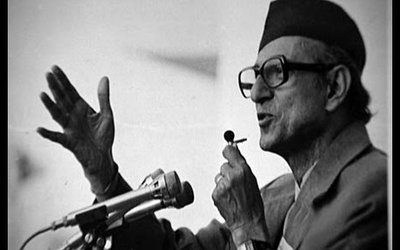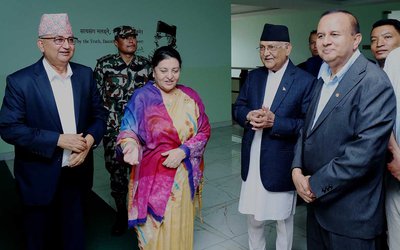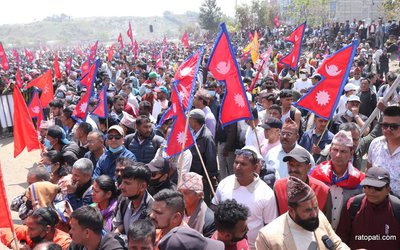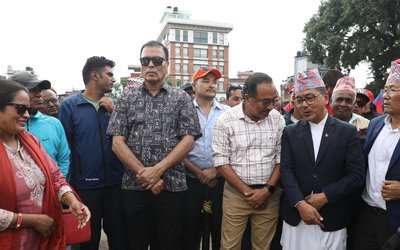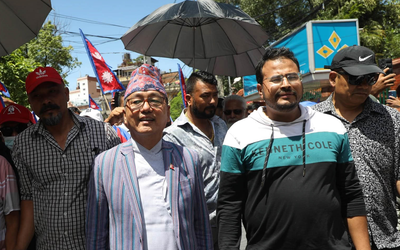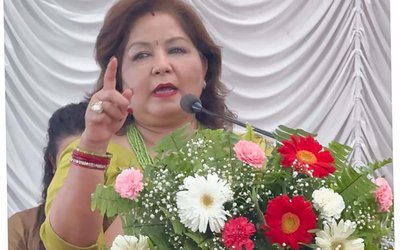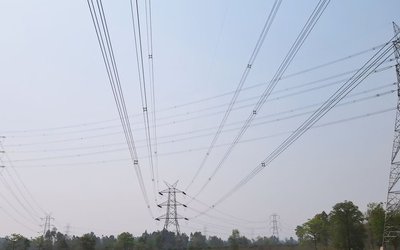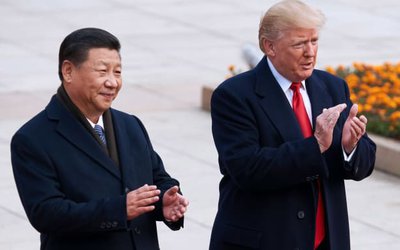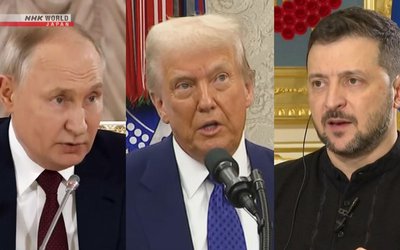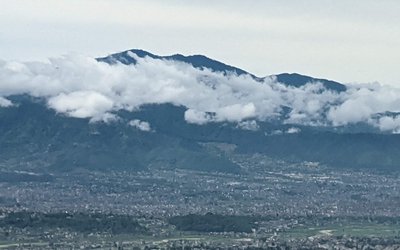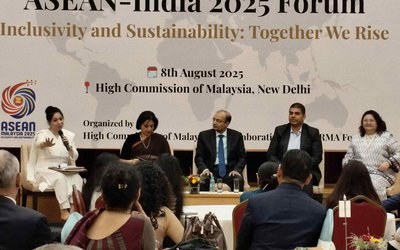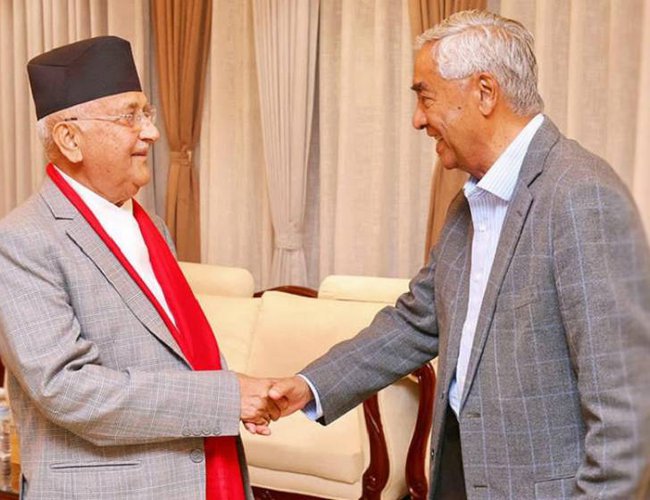
Prime Minister K.P Sharma Oli has been vocal about his commitment to upholding the coalition culture by sharing powerful appointments with the Nepali Congress.
However, the reality paints a different picture. UML has been appointing its own sympathizers to key positions, overshadowing the Nepali Congress leaders and their designated share.
An example of this is the delayed appointment of the Governor of the Nepal Rastra Bank, which should have been finalized before Chaitra 25. The UML and the Prime Minister, who previously replaced Kulman Ghising with their own supporter as the Managing Director of the Nepal Electricity Authority, are now also seeking control over the Governor of the Nepal Rastra Bank.
Journalist Yubaraj Ghimire highlights the shifting dynamics, noting that Oli appears to be disregarding Deuba's claim to the governor position at the Nepal Rastra Bank due to his alleged involvement in a conspiracy against Ghising. The Deuba couple reportedly approached Oli in desperation, urging him to swiftly become the Prime Minister in order to evade corruption investigations targeting themselves and their family.
The situation remains unchanged. Even if Oli were to take over as Governor of the National Bank, the Deuba couple would have no choice but to accept it. Whether the Congress will accept this situation or pressure the Deuba couple to find a way to maintain their self-respect is uncertain.
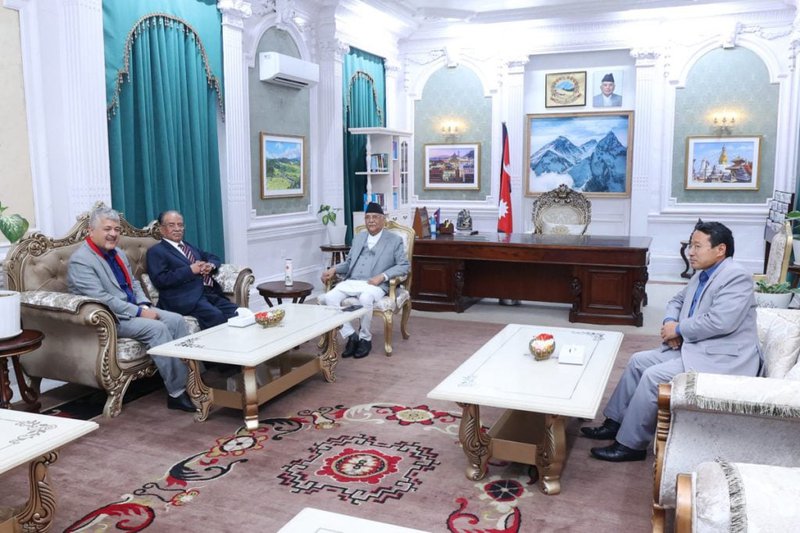
Oli has shielded all the leaders of his party and those involved in corruption. The Commission has not disclosed the statement made by Madhav Nepal regarding the irregularities and corruption in the Patanjali land case.
Oli is currently engaged in negotiations with a politically weak and corruption-ridden Nepal. If he parts ways with Deuba, his next move may involve forming the largest party or exploring alternative alliances.
While it is expected that Congress President Deuba will become Prime Minister in a few months as per the agreement with Oli, there is skepticism about the Congress's ability to govern effectively and combat corruption. Consequently, there is little enthusiasm among the public for Deuba's potenti al premiership.
The government's harsh crackdown in Tinkune on Chaitra 15 will not secure Oli's position in power or facilitate Deuba's ascent to power.
The leadership of the Nepal Police, actively involved in this repression, has transformed the police institution into a faction of the UML party. It is highly likely that Deepak Thapa will face investigation and legal consequences for severe human rights violations within two months of assuming office.
Amidst escalating state repression and corruption in Nepal, pro-monarchy forces have declared their intention to initiate a movement to reinstate the monarchy from Jestha 15, the day the republic was established, without consulting the Nepali people. This move is primarily orchestrated by Shyam Saran, pushing it towards a critical juncture.
With Oli's authoritarian and repressive stance towards dissenting views and political ideologies, the Congress and the Maoists are inadvertently contributing to the destabilization of the system.
The situation in Nepal has heightened tensions between neighboring India and Pakistan. The tragic incident on April 22, where terrorists killed 26 tourists, including a Nepali citizen, in Pahalgam, Kashmir, has brought the two countries closer together, causing concern worldwide.
While various concerned countries, including Nepal, have expressed their desire to prevent tensions between India and Pakistan from escalating, India, as a victim, understands that failure to eradicate terrorism will instill fear and insecurity throughout the country.
Nepal empathizes with India's pain and anger, recognizing that everyone is affected. Nepal maintains its stance against all forms of extremism in principle. In 2062/63, the Indian establishment placed the Maoists, labeled as terrorists, at the forefront of Nepali politics under its protection, leading to chaos, impunity, corruption, unrest, and external interference in Nepal.
India has yet to address this issue. Collaboration between Indian groups and the Maoists persists, but defeating terrorism requires that no country provides shelter or support to terrorists. Nepal's parliament has condemned the Pahalgam attack, but there has been limited discussion on how terrorism has impacted Nepal, fostering dependence and external interference in its internal affairs.
The current system and rulers are impacted by external intervention, making leaders like Oli, Prachanda, or Deuba unable to prioritize nationalism and the interests of Nepal.
Nepal's previous strong foreign policy and security stance has deteriorated since the democratic rule of 1990 and has continued to weaken since 2006/07. There is evidence of significant Western influence and funding for religious conversions under the guise of secularism in countries like the United States and Nepal. Indian Prime Minister Narendra Modi and Bharatiya Janata Party's foreign affairs chief Vijay Chauthaiwale have raised concerns about religious conversion in Nepal. Despite public dissatisfaction,leaders and parties benefiting from external support have not taken these issues seriously. The fight against corruption has also gained momentum alongside the opposition to religious conversions, with some advocating for the restoration of the monarchy.
In a political environment where external pressures shape political agendas and secularism is equated with republicanism and religious conversion, leaders have lost respect in the eyes of the people.
- EU’S ERASMUS MUNDUS: Scholarship For Quality Education
- Aug 05, 2025
- ADB: Partnership For Growth
- Aug 04, 2025
- HCC-N: Economic Ambassador
- Aug 03, 2025
- MONETARY POLICY: Disappointing Outcome
- Jul 17, 2025
- MELAMCHI WATER SUPPLY: No Interruption During Monsoon
- Jun 25, 2025
